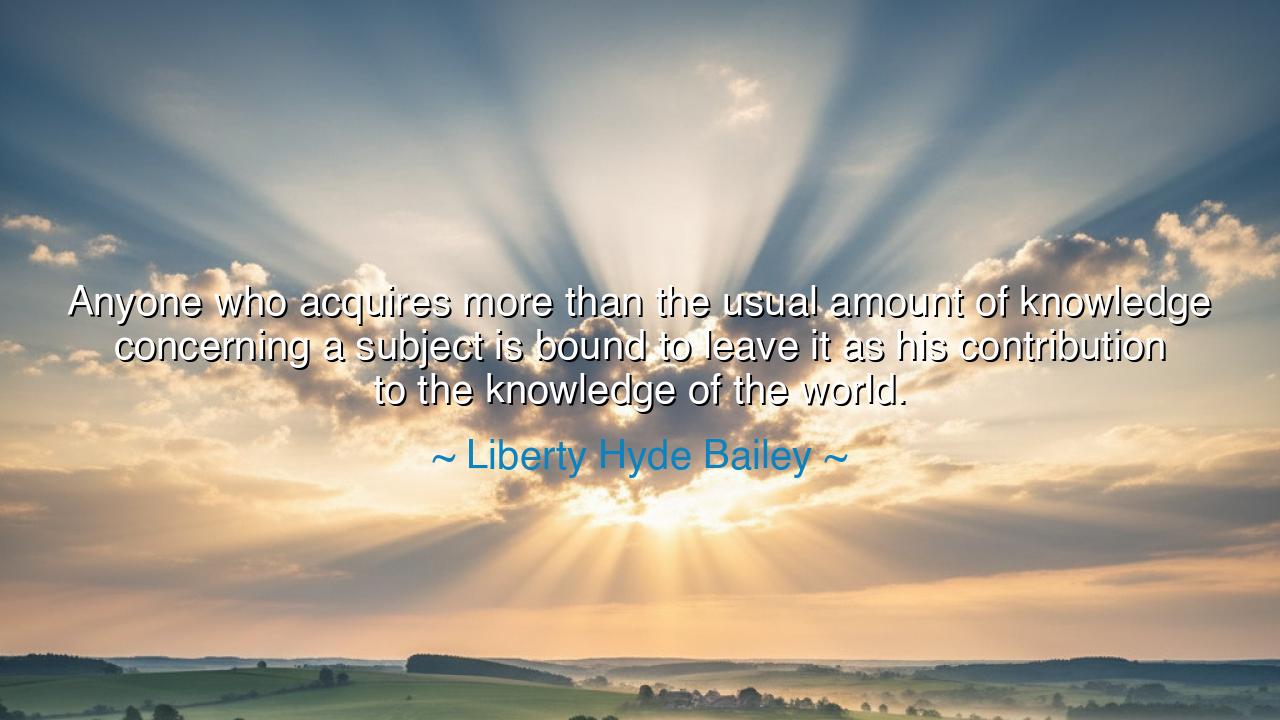
Anyone who acquires more than the usual amount of knowledge
Anyone who acquires more than the usual amount of knowledge concerning a subject is bound to leave it as his contribution to the knowledge of the world.






The great naturalist and teacher Liberty Hyde Bailey, whose soul was rooted in the soil and whose mind reached toward the heavens, once wrote: “Anyone who acquires more than the usual amount of knowledge concerning a subject is bound to leave it as his contribution to the knowledge of the world.” These are not idle words, but a creed of responsibility—a call to those who learn, to those who strive, and to those who discover. For in this saying, Bailey reminds us that knowledge is not possession, but inheritance. It is not to be hoarded in the vaults of pride, but shared as a gift to all mankind.
Bailey, born of humble beginnings in the farmlands of Michigan in the nineteenth century, was a man who found divinity in the commonplace. To him, the earth was a vast temple, and every leaf and seed carried wisdom. As a botanist, he studied plants; as an educator, he cultivated minds. Yet behind his scientific pursuits lay a moral truth: that every soul who learns something new owes it to the world to enrich the common store of understanding. Knowledge, he believed, is like a seed—its worth is realized only when it is sown, not when it is stored. Thus, when a person masters a subject, when they pierce a mystery or deepen an art, they do not merely own that wisdom—they become its steward.
In saying that one is “bound to leave it as his contribution,” Bailey speaks of an obligation higher than law: the duty of the enlightened to illuminate others. For knowledge is not inert—it seeks expression. Just as the river cannot hold back its flow, the mind cannot contain what truth it has found without losing part of its life. When we teach, when we write, when we act with understanding, we fulfill this law of the universe—the law of giving. It is the same rhythm that governs nature itself: the tree that bears fruit gives life to others, and through that giving, it endures.
History offers countless examples of this sacred cycle. Consider Isaac Newton, who once humbly declared, “If I have seen further, it is by standing on the shoulders of giants.” Newton’s discoveries in physics and mathematics became the foundation upon which later generations would build. He did not bury his insights in solitude, though he might have kept them for personal fame. Instead, he offered his knowledge to the world, extending the boundaries of human thought. His work became the bridge between ignorance and enlightenment, between wonder and understanding. In Newton, as in Bailey’s vision, knowledge was not an end, but a torch passed from one generation to the next.
But Bailey’s wisdom is not confined to the scholar or scientist—it belongs to all who learn, in any field, in any age. The craftsman who perfects his trade, the teacher who shapes young minds, the farmer who understands the rhythms of the seasons—all acquire knowledge that, when shared, elevates humanity. Every insight, however small, is a contribution to the whole. The world is not advanced by grand discoveries alone, but by the quiet accumulation of wisdom in countless hearts. When one person teaches another, when one hand guides another’s work, the circle of understanding widens, and civilization itself grows stronger.
O listener, take this teaching to heart: if you have learned something worth knowing, do not let it die with you. Pass it forward. Speak it, write it, live it. The world’s treasury of wisdom is built not only by genius, but by generosity—the willingness of ordinary people to share what they have found. Even the smallest truth, offered sincerely, may awaken greatness in another. Knowledge is not diminished by sharing; it multiplies, as a flame does when it lights another. The mind that gives freely does not grow poor—it becomes radiant.
And thus, Liberty Hyde Bailey’s words carry both humility and grandeur: knowledge is humanity’s inheritance, and every learner is a trustee of that inheritance. To learn, then, is not only a privilege but a moral duty; to share, not merely kindness, but justice. So let each of us be both student and teacher, receiver and giver. For when we leave behind the fruits of our understanding—be it through words, works, or the quiet example of a good life—we fulfill the law that binds all who seek truth: that no wisdom truly belongs to one, but to all.
In the end, remember this: to learn is to receive a gift; to teach is to return it to the world. If you have acquired more than others, do not keep it—plant it. Let your knowledge become a garden where future minds may grow, and thus your life will live on not only in memory, but in the enduring harvest of human understanding.






AAdministratorAdministrator
Welcome, honored guests. Please leave a comment, we will respond soon